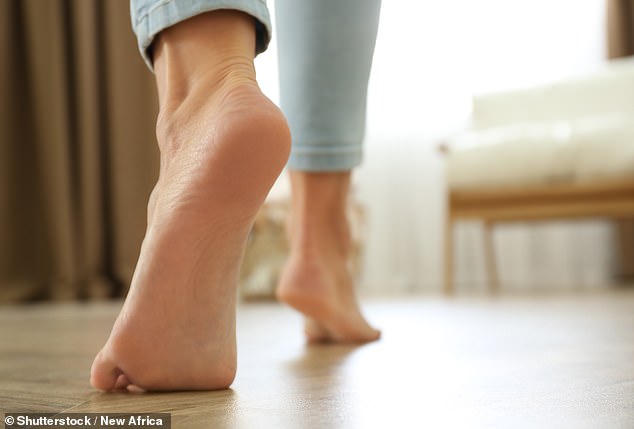A few years ago I had bad food poisoning, and since then I’ve developed wheat and lactose intolerance, as well as IBS. I also suffer from small bumps inside my lips which my dentist and GP seem mystified by. I’ve read that something called lipid transfer protein allergy causes this symptom. What do you think?
Food poisoning and other stomach bugs can trigger ongoing problems such as lactose intolerance – a reaction to the sugars in milk and other dairy products. However, it usually goes away. Irritable bowel syndrome (IBS) and a similar condition it’s often confused with, small intestinal bacterial overgrowth (SIBO), are also seen.
SIBO causes diarrhoea, pain, nausea and even weight loss due to an overgrowth of bacteria in parts of the bowel. This usually requires treatment, after tests with a gastroenterologist.

ASK DR ELLIE: A few years ago I had bad food poisoning, and since then I’ve developed wheat and lactose intolerance, as well as IBS.
Lipid transfer proteins are found in foods such as nuts, seeds and some cereals, along with the peels and pips of certain fruit such as grapes and apples.
An allergy to them is unusual and causes swelling of the lips and tongue, hives on the skin and vomiting. In rare cases, a more severe anaphylaxis reaction can occur in which the airways swell. Those known to suffer from this need to carry an EpiPen.
Raised bumps in the mouth are not a recognised symptom of lipid transfer protein allergy.
The only way to know is via a referral to an NHS allergy clinic where testing can be carried out, however these clinics are few and far between. Another option would be to keep a food diary and see if eating specific things trigger problems.
I suffer from breathlessness and have had to give up swimming, which has been something I’ve done regularly since my teens (I am now in my late 70s). I also struggle to walk very far. A chest X-ray, lung tests and angiogram came back normal. I’m taking statins, thyroxine and omeprezole. Could these be causing my problem?
There are many causes of breathlessness, and in someone older it may take time and a few tests to get to a diagnosis. A GP can arrange heart investigations, lung scans as well as blood tests.
Smoking-related lung problems such as asthma or rarer lung diseases including bronchiectasis – where the airways of the lungs become widened – all result in breathlessness.
It is also important to recognise that chest X-rays do not always pick up all lung conditions and can even miss lung cancers. For this reason, sometimes a CT scan may be needed.
Heart problems also cause breathlessness, including abnormal heart rhythm such as atrial fibrillation or heart failure. We prescribe diuretics – sometimes called water tablets – for heart failure, which ease the symptoms, but many people dislike taking them as they can make you need the bathroom a lot. If water tablets are stopped, breathlessness caused by heart failure may return.

ASK DR ELLIE: I suffer from breathlessness and have had to give up swimming, which has been something I’ve done regularly since my teens (I am now in my late 70s). I also struggle to walk very far (Stock image)
Other causes could be anaemia or anxiety. There are other drug options for heart failure you can discuss with a GP.
Statins, and drugs thyroxine and omeprazole, would not normally cause breathlessness as a side effect.
My husband has suffered foot pain for almost two years. He’s seen a GP twice, a physiotherapist, a podiatrist, had tests and scans – which flagged up something called a neuroma – received painful steroid injections into his foot, bought the recommended trainers and insoles, tried acupuncture, massage and reflexology… and none of these have helped. Any thoughts?
Foot pain can be distressing as it stops people getting about and living a normal life.
One common cause is Morton’s neuroma, which is a thickening of tissue around the nerves between the toes.
Patients often describe a burning or stabbing pain, or that it feels like there is a stone in their shoe. For some, there can be numbness or tingling.
It usually starts after heavy or prolonged exercise which is putting pressure on the foot and irritating the nerves.
We know it is more common in people who are overweight or have rheumatoid arthritis.
Unfortunately it can get worse over time.
Wide shoes, soft soles, orthotics – customised shoe inserts – and painkillers such as paracetamol or ibuprofen will help.
From a specialist, the treatment would involve steroid or alcohol injections, and also something called radiofrequency ablation – where heat is used to treat the nerve so it can no longer send pain signals. There are also numerous surgical options which would usually be done by an orthopaedic surgeon.
Decompression surgery involves removing tissue around the nerve to take the pressure off or removing the nerve altogether. This removes the pain but can also cause permanent numbness, so patients have to weigh up the risk of this against the benefit of reduced pain.

ASK DR ELLIE: My husband has suffered foot pain for almost two years










